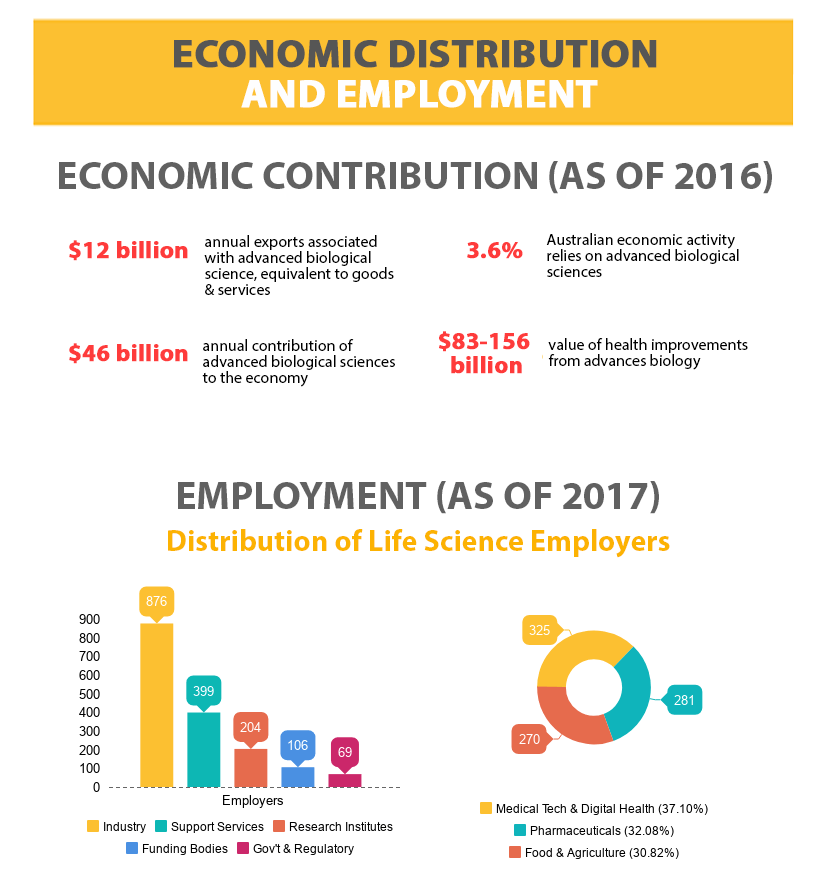Addressing the Skills Gap in the Science Industry
Australia has ranked in the top five globally for biotechnology in the past three years, outperforming the United Kingdom and Germany, according to Scientific American Worldview.
The government policy and funding programs desire to develop medical technology, digital health, agritech and food tech, therapeutics, regenerative medicine and other key areas of the life sciences.
The potential benefits for addressing the science talent shortages are tremendous. Investing in scientific talent development can benefit the Australian economy in plenty of ways: innovation, boost in the economy, global investment and competitiveness. Such a transformation requires a joint effort by the government, life science industry, R & D institutions, colleges/universities and private enterprise.
Just how big deal biotechnology and life science in Australia?
The Australian Academy of Science, AusBiotech and the Department of Jobs and Small Business shows important statistics regarding the economic and employment contribution of the life science sector in Australia:
Economic Contribution, Employment Statistics & Industry and Employment Future Forecast

Click the link to view the complete infographic
Skills Gap in the Life Science Sector
Australia’s drive to achieve it's National Innovation’ goal created a huge demand for the life science workforce.
In the report ‘Readiness to meet the demand for skills: a study of five growth industries’, NCVER (National Centre for Vocational Education Research) noted the reasons for the skills gap:
-
a disconnect between the current level of training provided by universities/colleges/vocation education sectors and the industry’s future training needs
-
skills learned by students in the university are insufficient
-
academic and industry interests are not always aligned
Moreover, Glen Cross, AusBiotech CEO, noted the difficulties in recruiting employees in senior leadership level. The country is struggling to employ professionals with relevant commercial experience. NCVER also indicated how the skills gap caused some staffing struggles within the life science industry:
-
Recruiting staff with adequate skills and experience in Australia, particularly at senior levels. Senior managers and leaders are being recruited from other industries and abroad, with the greatest unmet demand being for regulatory affairs skills.
-
Hiring people with commercial and business development skills in regulatory affairs, clinical strategy and project management, licensing negotiation, risk management and technical and scientific skills in bioinformatics and biostatistics
In addition, the relatively small size of Australia’s private biotechnology industry can also make it hard for graduates to find jobs outside the academe and research institutions.
Opportunities to Address Skills Gap
Skilled Migration
According to Cross, a visa program should be in place to permit Australian companies to access international talent where it assists the transfer of knowledge and skills and supports Australian businesses in operating at a global standard. Gaps in research and industries create highly-attractive technical jobs, draw attention to clinical research, upskills the local talent pool and grows the local economy.
TSS Visa
In this regard, Temporary Short Stay (TSS Visa) must be viewed as a tool to fill the skill gaps, specifically in hiring science professionals in senior roles unavailable locally.
In the medical technology, biotechnology research and pharmaceutical sectors, the following occupations are eligible for TSS visa:
-
Biochemist
-
Biotechnologist
-
Life Scientist
-
Nurse Researcher
-
Production Manager (Manufacturing) - short-term visa only
-
Research & Development Manager - short-term visa only
-
Patents Examiner - short-term visa only
-
Laboratory Manager - short-term visa only
Global Talent Scheme
Under the TSS (Temporary Skill Shortage) visa program, the Global Talent Scheme is another pathway to employ hard-to-find scientific talent.
The scheme’s objective is to fill highly-skilled and specialized niche (science, technology, engineering, medicine) positions that can’t be filled by Australian employers and through other visa programs.
More information about the Global Talent Scheme available in this factsheet.
Continuing Professional Development
In the long-term, Australia must produce its own homegrown scientific talent to push the country’s National Science and Innovation Agenda.
NCVER proposed the following recommendations to science skills shortage:
-
Establish an education system that combines formal training, in-house mentoring and team learning to create a cohesion between qualifications and experience.
-
Universities and companies must work closely to understand the business environment to ensure a supply of appropriately skilled graduates. The public TAFE system must bridge the gap between knowledge taught in universities and industry best-practices. TAFE has a strong association with workplaces and greater potential to translate research findings into actual implementation.
-
Establish industry-based (IBL) programs within college courses. According to Swinburne University, advantages of IBL for students include gaining valuable industry experience and skills, growing a professional network, getting a head start in the competitive graduate job market and earning while learning. Though IBL can be time and money-consuming for employers, especially for small businesses, the government must provide incentives like tax breaks or research funding to encourage them to invest in IBL.
-
Create a more diverse workforce, which involves the enhancement of organisational and business models. NCVER noted a projected increase in demand for professionals doing business development, marketing, sales as the local science industry matures.
Conclusion
Analyzing and addressing the skills gap in the Australian life science sector is just the beginning. It is an industry that constantly evolves – the rapid growth in biotechnology, medical research and pharmaceutical sector demands a workforce not only with advanced science and technology skills but also proficiency in handling commerce and business development.
CONTACT US SUBMIT YOUR VACANCY SUBMIT RESUME